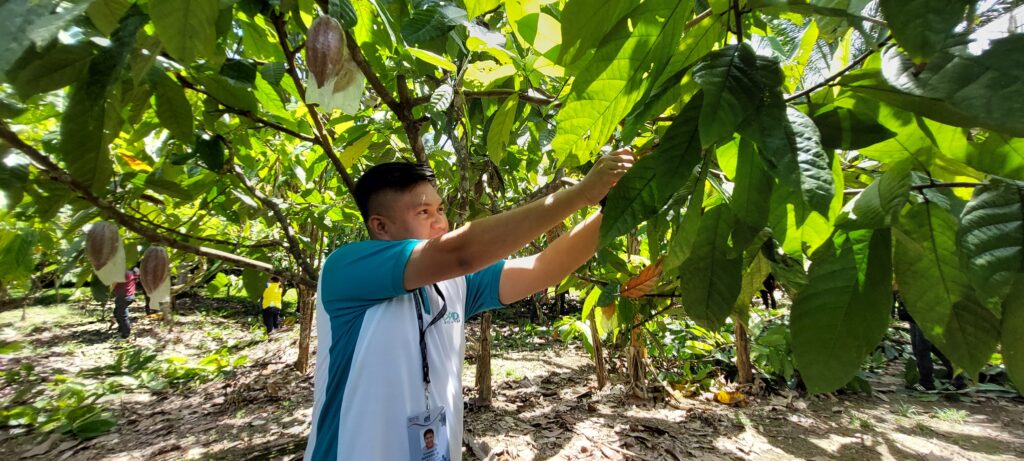One of the major issues of the cacao industry, not only in Davao de Oro, but in the entire country is the low productivity of trees, leading to low production. Many underlying factors contributing to this challenge were identified by national and local enablers. These include high incidence of pests and diseases, low soil fertility, high cost of inputs leading to non-management of most smallholder cacao farms, and its exposure to climate threats like drought and heat.
As part of its efforts to promote economically viable and environmentally sustainable cacao production, the SFITAL project in the Philippines promotes agroecological practices for climate resilient and environment-friendly cacao production.

Mulching cacao trees with dried coconut husks help in preserving soil moisture and enhancing soil organic matter.
Agroecological practices are agricultural practices integrated with ecological principles, helping make the cultivation of any crop safe for humans and the environment, and adaptable to changing climate conditions.
There are various agroecological practices from establishment to market stage of cacao alone. These practices cover soil health and fertility, soil and water conservation, and pests and disease management, among others. Generally, these practices are guided by these principles:
- Recycling organic materials
- Reducing use of chemical inputs
- Securing and enhancing soil health
- Maintaining or increasing agrobiodiversity
- Promoting economic diversification; and
- Co-creating knowledge.
Specifically, for cacao cultivation, such practices include integrating nitrogen-fixing species with cacao and using proper shade trees, as well as using pruned branches and litterfall as mulch to increase soil organic matter. It also includes establishing contour lines made of natural vegetation or fodder grass in sloping lands to reduce soil erosion or building trash alleys around cacao trees.

Regular and proper pruning is an agroecological practice that prevents infestation of pests and diseases.
Agroecological practices bring various benefits to smallholder farmers. Firstly, it helps improve their overall farm productivity, as such practices as expected to enhance soil health and decrease the risk of pests and diseases outbreaks. Such practices also help smallholder farmers to have a more diversified and stable income since it promotes the integration of several crops and helps in ensuring efficient use of resources. Lastly, it builds the smallholders’ resilience to climate threats, as agroecological practices are expected to help improve the micro-climate of farms.
In line with this, the SFITAL project is currently conducting a series of trainings of trainers and trainings of farmers in Davao de Oro to capacitate local field extensionists and farmer leaders on specific agroecological practices, like integrated pest and disease management and soil and water conservation, among others. Additionally, the project has also started the establishment of learning farms in the municipalities of Laak, Maco, Nabunturan, and New Bataan, to demonstrate these agroecological practices, working with local farmer-cooperators.
Lastly, the project is crafting a technical guide on agroecological practices for environment-friendly and climate resilient cacao cultivation. This guide, which is expected to be produced this year, aims to complement existing reference materials used by local field extensionists in Davao de Oro on cacao cultivation. This is coupled with a sustainable cacao development curriculum that integrates existing trainings on cacao with agroecological practices.